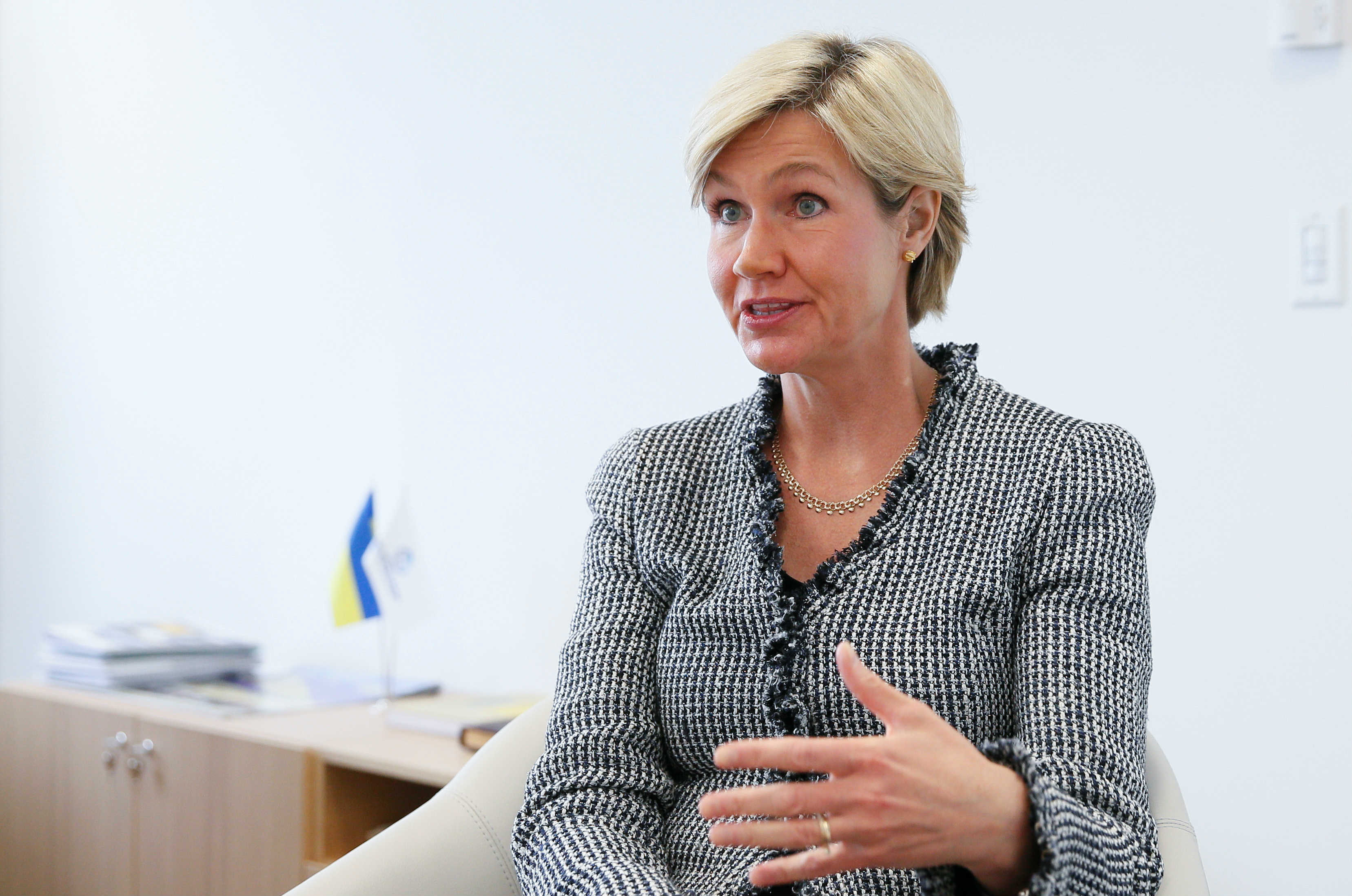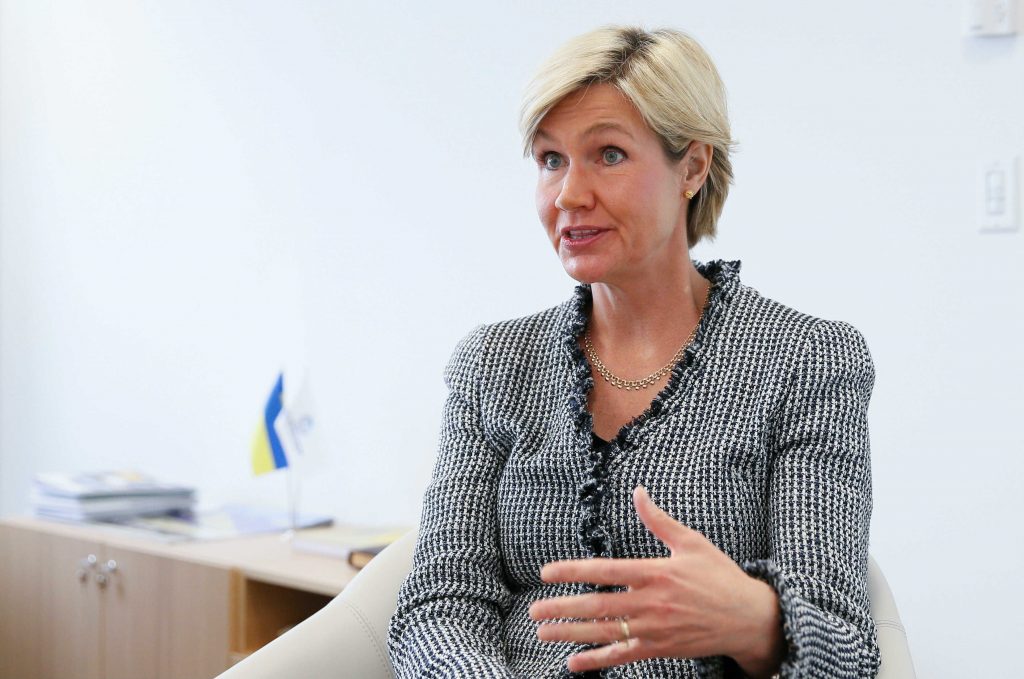 Ukraine just received a marginally better grade on the World Bank’s Ease of Doing Business Index, moving from 80th place in 2017 to 76th place in 2018. Kyiv reduced the cost of construction permits, strengthened minority investor protections, and reduced labor taxes. To put things in perspective, it’s easier to do business in Azerbaijan, Belarus, and Russia, and slightly easier in Greece and Uzbekistan. We asked Atlantic Council experts, UkraineAlert contributors, and businesspeople in Kyiv the following question: What five steps should the government undertake in 2018 to catapult Ukraine from its current place to the top 10?
Ukraine just received a marginally better grade on the World Bank’s Ease of Doing Business Index, moving from 80th place in 2017 to 76th place in 2018. Kyiv reduced the cost of construction permits, strengthened minority investor protections, and reduced labor taxes. To put things in perspective, it’s easier to do business in Azerbaijan, Belarus, and Russia, and slightly easier in Greece and Uzbekistan. We asked Atlantic Council experts, UkraineAlert contributors, and businesspeople in Kyiv the following question: What five steps should the government undertake in 2018 to catapult Ukraine from its current place to the top 10?
Andy Hunder, President, American Chamber of Commerce: The fact that Ukraine notched up four spots in the World Bank’s 2018 Ease of Doing Business Index is a slow but sure step forward. Over the past year the Ukrainian government together with the business community has been working to overcome obstacles in infrastructure, investors’ rights protection, and paying taxes. Ukraine’s index performance is currently lagging behind in connecting to the electricity grid, trading across borders, and resolving insolvency. To boost these low rankings, Ukraine should simplify procedures, reduce time and cost to getting electricity, increase effectiveness of the single window at customs, and ensure the rule of law through implementation of full-scale judicial reform. A lot still needs to be done to make Ukraine’s regulatory environment more business friendly, but the country seems to be on the right track.
Peter Dickinson, Nonresident Fellow, Atlantic Council and Publisher of Business Ukraine: The key business challenge the country is facing remains the creation of a functioning court system. In the short-term, this means establishing an anticorruption court while the broader judiciary can be completely reformed. Financial law enforcement needs a total overhaul to rid the sector of ugly raiding tendencies, with the creation of a new state agency the only plausible solution. Banks need to receive far greater legal protections from bad debts and bad faith borrowers if they are to fuel the economic recovery. Attractive new conditions should be created specifically for the IT sector in order to build on Ukraine’s strong position in this industry and attract talent rather than suffer further brain drain. Finally, agricultural land sale reform would be a huge step forward for the Ukrainian economy, but such an anti-populist move looks virtually impossible with presidential and parliamentary elections looming on the horizon.
Martin Schumacher, Chief Executive Officer, METRO Cash & Carry, Ukraine:
1. VAT reform
Eliminate the preferential treatment of “small entrepreneurs.” Apply consistent VAT rates to any commercial activity and apply the same rate of VAT to any transaction. This will massively broaden the tax base and allow the reduction of VAT in some areas, like reducing the VAT on food from 20 percent to 10 percent.
2. Customs enforcement
Increase border control and customs enforcement to ensure that all imports and exports are treated in the same legal and compliant way.
3. Rule of law
Reform the courts, appoint new judges where that hasn’t happened yet, and guarantee due process rights.
4. Land reform
Guarantee property rights and allow the private ownership and easy legal transfer of land ownership to open the agriculture for massive foreign investments.
5. Deregulation
As a principle, simplify regulation, abolish Soviet-era laws, and replace them with EU-standard legislation.
Anatoliy Amelian, Co-founder, Ukrainian Institute for the Future: Ukraine’s parliament should pass bill 6540, which would move Ukraine from 76th to 42th place on the World Bank’s Ease of Doing Business Index. In particular, the legislation would increase the rights of minority shareholders, introduce simplified bankruptcy procedures, make it easier for businesses to get loans, simplify business registration, expand the authority of arbitration judges, and improve real estate registration, among others. This bill should be voted on before the end of the year, and parliament should approve it without delay. This bill potentially gives a base to attract an additional $19.2 billion to the Ukrainian economy.
Alexander Pochkun, Managing Partner, Baker Tilly: If one considers the criteria that were used in the World Bank’s Ease of Doing Business Index, it is obvious what the government of Ukraine should do to change the situation and improve our current position. Everywhere everybody is already talking about it, but nothing is being done and it looks like we are all waiting for some miracle to happen by itself.
It’s no surprise that Ukraine gets the lowest marks for “resolving insolvency,” “trading across borders,” and “getting electricity.”
Resolving insolvency and protection of minority investors directly depend on the judicial system; our government needs to undertake transformative reform there.
De-monopolization of the electricity generating market will help to eliminate corruption and will make the market more transparent and open, which will create healthy conditions for competitors and increase the quality and reliability of service providers.
Ukraine’s low position on trade is a result of its “ancient” currency legislation that is neither adapted to the situation in the country nor in the world. Adopting new currency regulations would lay the groundwork for more stable, open, and strong trade relations.
Of course the path to a “top 10” country on the index is very long and many more actions are needed. To launch this process, these basic reforms need to be undertaken as soon as possible if we want to see some change and not appear in the bottom 10.
Morgan Williams, President, US-Ukraine Business Council: There are not five reforms that the government of Ukraine could undertake in 2018 to catapult Ukraine from its current place to the top 10.
This kind of significant jump is not in the realm of possibility or in the realm of reality. Ukraine does not pass major reforms quickly, they do not implement them quickly, and there is not enough political will in Kyiv to undertake high-level reforms in the next twelve months with a presidential election around the corner.
There are some major reforms that Ukraine could implement that could help move Ukraine to a better place on the index. These include land market reform, judicial reform, de-monopolization of state industries like railroads and energy companies, privatization of state companies, and tax reform.
All of these reforms have been discussed for many years with little action and few real significant results. Given today’s reality, the best Ukraine could expect to rank in the 2018 index would be to go from 76th to around 70th.
Oleksandr Kashko, Economist, Center for Economic Strategy: This year Ukraine only rose by four positions on the overall index because there was a systemic blockage of key decisions. Ukraine felt short on insolvency, electricity, trade, contract enforcement, and investor protections. The good news is that most of these issues can be resolved by passing bill 6540. If the Verkhovna Rada adopts the bill in the first quarter of 2018 and kick-starts its implementation, one can expect a significant improvement of the overall position of Ukraine next year.
Melinda Haring is the editor of the UkraineAlert blog at the Atlantic Council. She tweets @melindaharing.
Image: Satu Kahkonen, World Bank Country Director for Ukraine, Belarus and Moldova, speaks during an interview with Reuters in Kiev, Ukraine, October 4, 2017. Picture taken October 4, 2017. REUTERS/Valentyn Ogirenko
